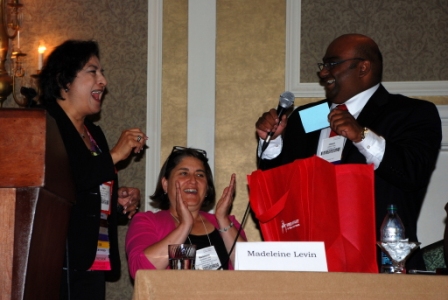The School Nutrition Foundation held a well-attended educational session on the last day of ANC 2011. “Expanding School Breakfast: Bringing Everyone to the Table” focused on the communication and marketing aspects of creating the partnerships necessary to implement a successful universal, in-classroom breakfast program. Drawing on our experiences from the last year, presenters—all participants in the Partners for Breakfast in the Classroom initiative—shared stories, tips, and creative solutions for generating interest in universal breakfast in the classroom.

The Breakfast in the Classroom Panel at ANC 2011.
Our presenters, left-to-right: Madeleine Levin, FRAC; Hitesh Haria, Deputy Superintendent, Business Operations at Memphis City Schools; Alonzo Brown, Principal, Crump Elementary (Memphis); Keith Williams,President, Memphis Education Association; Kim Stewart, Dietitian, Memphis City Schools
Our presenters touched on a number of important issues surrounding universal, in-classroom breakfast. Madeleine emphasized the importance of collaboration and communication; addressing barriers with teachers and principals who express resistance to in-classroom breakfast, and using the facts about breakfast—it improves test scores, and can be implemented with minimal additional work for everyone involved—to create support for the program.
Hitesh Haria began his presentation with a question: Can a car move without fuel? And of course, the answer is “no.” Mr. Haria noted that breakfast in the classroom can be financially sustainable, and was in fact can help fund improvements to your meal program. Mr. Haria talked about the measurable benefits of universal, in-classroom breakfast like higher attendance and fewer tardies, and said that kids are more excited to come to school when breakfast is waiting for them. “Bring everyone to the table,” said Mr. Haria, “just like you do to eat.”
Principal Alonzo Brown of Crump Elementary in Memphis discussed ways to communicate with custodians and teachers to meet and overcome concerns about in-classroom breakfast, like meal delivery and garbage disposal. “Challenges were washed away cleanly and clearly by communicating,” said Principal Brown. After some initial resistance, Mr. Brown says that his teachers now love breakfast in the classroom and the ability it gives them to bond with their students in a new way; the teachers like connecting the children to good nutrition. Everyone in the ballroom laughed when Mr. Brown confessed, “Guess who’s eating breakfast now? The principal!”
When Keith Williams of the Memphis Education Association spoke, he focused on how to create support among teachers for in-classroom breakfast. By helping teachers understand the direct link between breakfast and student concentration and focus, behavior, and test scores, Williams said teachers can be the biggest proponents of in-classroom breakfast programs. Mr. Williams also noted that in-classroom breakfast gives teachers an additional tool for teaching: not only can the short, in-classroom breakfast period be used for nutritional instruction, but nutrition can carry over into other subject matters to illustrate subjects like math (counting calories, nutrition data) and global studies (where foods come from). An unanticipated but welcome side-effect of in-classroom breakfast? Improved etiquette and social skills for students—talk about creating teachable moments!
When Memphis City Schools dietitian Kim Stewart wrapped up the session she did so with a short but effective anecdote about a teacher who had a real change of heart about breakfast in the classroom. Kim told us the story of a teacher who was strongly opposed to the breakfast in the classroom program when it was first proposed, but who did a 180 when she saw the difference it made in the students in her own classroom. Kim said, “She had no idea how hungry her own kids really were.” It was a powerful testimonial about the realities of hunger in America—the main story in the media is often about obesity, but hunger and food insecurity are real problems. Breakfast in the classroom can and should be part of a real solution.

SNF Chair Dora Rivas, FRAC’s Madeleine Levin & Hitesh Haria pick the breakfast cart winner after the session.

Cambro breakfast cart winner Teal Carpenter, Gloversville Enlarged SD (NY) and SNF Chair Dora Rivas (Dallas, TX).
